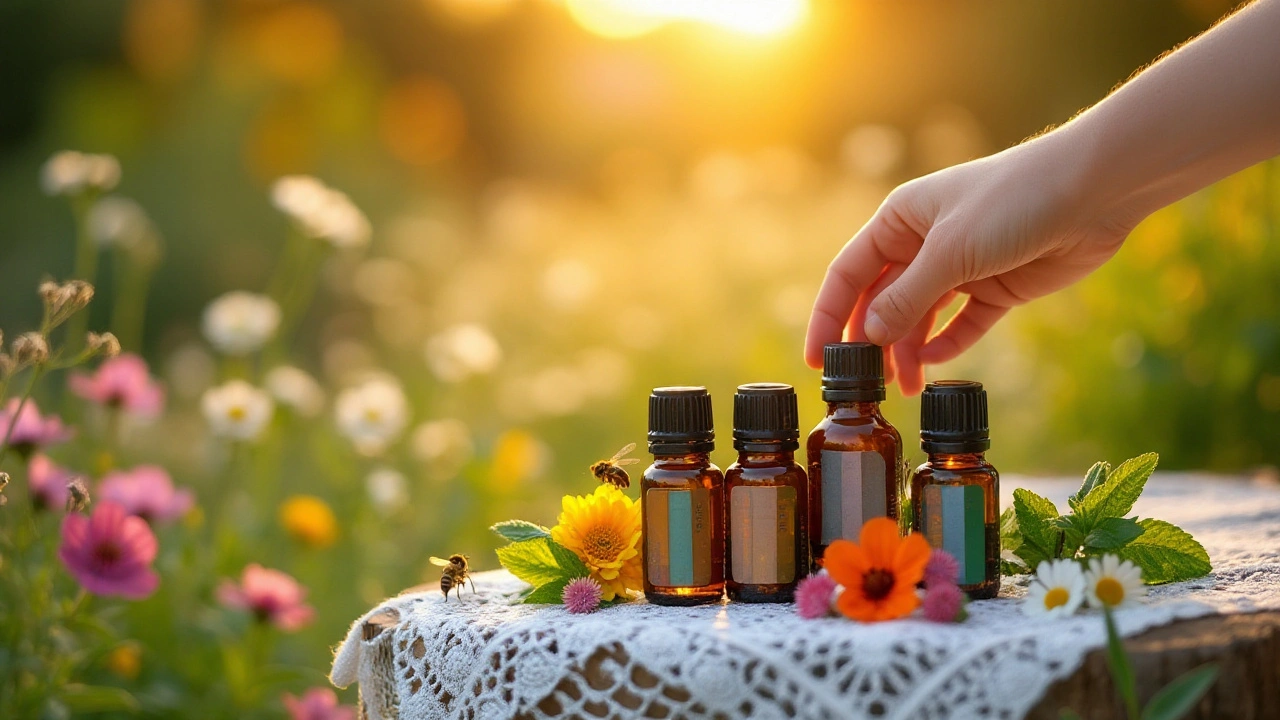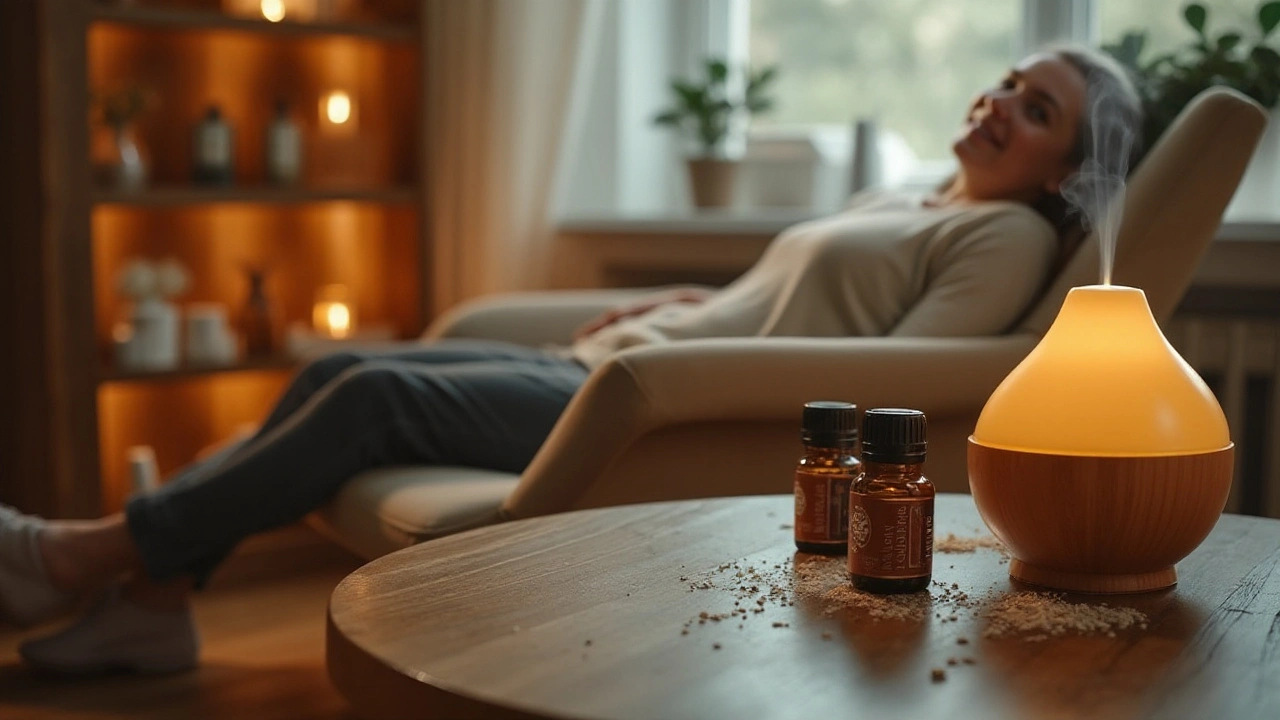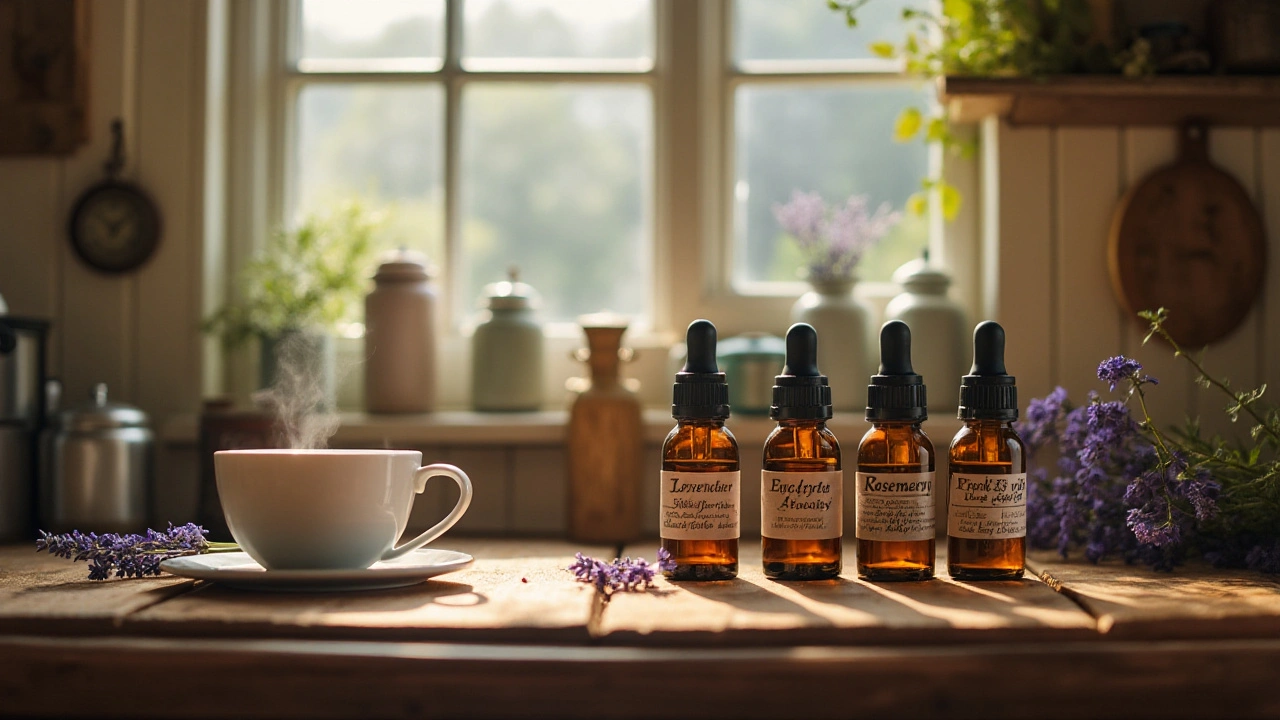Aromatherapy has been cherished for centuries, cherished for its ability to nourish the mind and body through the potent scents of essential oils. Whether you're seeking tranquility, energy, or a sense of clarity, the right selection of oils can transform any space into a haven of peace and joy.
Let's embark on a scented journey to explore the top ten essential oils that will enhance your aromatherapy collection. Each oil comes with its own set of enticing properties and benefits, suitable for a myriad of moods and needs.
From calming lavender to invigorating peppermint, these oils not only fill your home with delightful aromas, but they also offer therapeutic benefits that can support your health and well-being. Keep reading to uncover how these powerful plant essences can be a beneficial part of your daily routine.
- Lavender Oil: The Calming Marvel
- Peppermint Oil: Awakening Your Senses
- Eucalyptus Oil: Breathe in the Freshness
- Tea Tree Oil: Nature's Antiseptic
- Lemon Oil: Sunshine in a Bottle
- Frankincense Oil: The Ancient Oil of Tranquility
Lavender Oil: The Calming Marvel
Lavender oil is often celebrated as the ultimate remedy for relaxation, earning its nickname as nature's balm for the restless mind. Originating from the violet blooms of the Lavandula angustifolia plant, this essential oil has been a staple in soothing rituals across various cultures, praised for its calming and harmonizing impact. It has a distinct aroma that's both floral and herbaceous, an olfactory combination that's wonderfully grounding yet uplifting at the same time. Historically, it was utilized by the Romans, who valued its scent and cleansing properties, incorporating it in their daily bath routines.
A remarkable aspect of lavender oil is its universal appeal—it's one of the few essential oils suitable for use by all ages, from children to elders. This oil is most renowned for its ability to help ease anxiety and stress, creating an environment of calm and peace. Recent studies suggest that incorporating lavender oil in aromatherapy practices can significantly reduce the symptoms of insomnia, making it easier to drift into restful slumber. Moreover, its potential to alleviate headaches and migraines has provided solace to many who suffer from these conditions.
"Lavender essential oil is a handy and effective aid to relaxation, stress reduction, and improvement of sleep quality," says Dr. Jane Buckle, an expert in clinical aromatherapy.
In skincare, lavender oil is a gentle healer. Its soothing qualities extend to irritated skin, making it a go-to for minor burns, insect bites, and mild acne. Adding a few drops to a carrier oil can create a nourishing massage blend that helps relax tired muscles and joints. Additionally, its natural anti-inflammatory and antibacterial properties make it a preferred choice to support skin health.
If you wish to introduce lavender oil to your home, you'll find it's incredibly versatile. A simple method is to add a few drops into a diffuser, allowing its sweet aroma to fill the space. Alternatively, incorporate it into your evening bath by blending it with Epsom salts for a spa-like experience that calms the mind and rejuvenates the body. Its effectiveness, combined with its pleasant scent, has made lavender a timeless hero in the world of aromatherapy.
For those interested in stats, according to a survey conducted by the Global Aromatherapy Market Analysis, lavender oil accounts for nearly 30% of essential oil sales worldwide, underscoring its popularity and trust among users. Whether you're seeking to calm your nerves or simply elevate your living atmosphere, Lavender oil stands as a beacon of serenity in a fast-paced world.
Peppermint Oil: Awakening Your Senses
Peppermint oil, with its distinctively fresh and minty aroma, has long been favored for its ability to invigorate the mind and enliven the senses. Derived from the leaves of the peppermint plant, this essential oil is more than just a pleasant fragrance; it's known for its wide array of therapeutic properties that have been recognized and used for centuries. One of its hallmark features is its menthol content, which lends a cool, tingling sensation when applied topically, providing relief and refreshment.
The invigorating scent of peppermint oil can help boost your mood and improve concentration, making it a perfect companion for those needing a mental pick-me-up during the day. It is also known to alleviate headaches and migraines, with some users finding that a few drops rubbed into the temples can help reduce the intensity of these ailments. Interestingly, research has demonstrated that peppermint oil can aid in digestive health, showing benefits in reducing symptoms of irritable bowel syndrome and functional dyspepsia. By relaxing the muscles of the GI tract, it helps ease discomfort and promotes smoother digestion.
To harness the benefits of peppermint oil, you can incorporate it in several ways in your daily routine. One popular method is through diffusion, which allows its energizing aroma to fill a room and invigorate the atmosphere around you. Another way to utilize peppermint oil's cooling properties is by mixing a few drops with a carrier oil and massaging it into sore muscles for relief after a workout. This dual action of providing both aromatherapy benefits and direct application makes peppermint oil a versatile addition to any aromatherapy collection.
"A drop of peppermint oil a day can help keep fatigue away," says Dr. Linda Smith, a renowned expert in alternative medicine, highlighting the oil's indispensable role in holistic health practices.
When selecting peppermint oil for your aromatherapy toolkit, it's important to choose a high-quality, pure grade oil to ensure maximum benefits. Look for products marked as therapeutic grade to get the most potent version of this oil. As with any essential oil, always perform a patch test when applying it to your skin and dilute it appropriately with a neutral carrier oil to prevent irritation. If you're planning to ingest peppermint oil, under the guidance of a healthcare professional, make sure it's food-grade quality.

Eucalyptus Oil: Breathe in the Freshness
Eucalyptus oil, well-regarded for its invigorating and refreshing scent, has been a staple in both traditional and modern wellness practices. This potent essential oil is primarily derived from the leaves of the Australian Eucalyptus tree, a species that can tower over 60 meters in height. Known for its natural antiseptic and decongestant properties, eucalyptus oil is cherished in aromatherapy for its ability to help clear the mind and breathe effortlessly. When utilized in a diffuser, it creates an environment that feels airy and fresh, often likened to a stroll through a grove of towering trees on a crisp day.
One of the most compelling benefits of eucalyptus oil is its potential to enhance respiratory function. Inhaling the crisp aroma can aid in unblocking nasal passages, alleviating the infamous stuffiness that accompanies colds or seasonal allergies. This is due to its active compound, eucalyptol, which research has shown to possess anti-inflammatory and antimicrobial qualities. Many therapists recommend combining this oil with peppermint for a potent blend that promotes clearer breathing and mental clarity. Such combinations can turn any room into a sanctuary of health and serenity, as you bask in the natural healing powers of essential oils.
The versatility of eucalyptus oil extends beyond inhalation. It's a natural powerhouse in homemade cleaning products, providing a disinfecting property that is free from harsh chemicals. A few drops added to water can serve as a refreshing surface cleaner, while spreading its invigorating scent throughout the home. For those seeking skin relief, diluted eucalyptus oil is a common ingredient in balms and lotions designed to soothe muscle soreness and insect bites. However, as with any essential oil, it's crucial to conduct a patch test or consult with a professional, ensuring safe usage on the skin.
"Eucalyptus oil is not just a remedy; it's a lifestyle choice," states Dr. Angela Browning, a holistic wellness expert. "Its multifaceted applications, from promoting respiratory health to enhancing mental focus, make it indispensable in my practice."
Interestingly, eucalyptus oil has made its mark beyond the domain of personal care. In the realm of agriculture, it's employed as a natural pesticide, providing an eco-friendly solution to ward off pests without harming beneficial insects or plants. This highlights the oil's potential to contribute to more sustainable living practices. Despite its powerful properties, eucalyptus oil is wonderfully gentle on the environment, encouraging practices that align with ecological sensitivity.
In a study conducted by the Journal of Phytotherapy Research, 95% of participants reported improved breathing and reduced nasal congestion when eucalyptus oil was part of their treatment regimen, illustrating the efficacy that many practitioners have promoted for years. As the dialogue around natural remedies grows louder, eucalyptus oil often stands out as a beacon of what pure, plant-based nourishment can offer both the body and soul. Integrating this essential oil into your aromatherapy collection is more than just a choice—it's an invitation to breathe deeply and live boldly.
Tea Tree Oil: Nature's Antiseptic
Tea tree oil, derived from the leaves of the Melaleuca alternifolia, a small tree native to Australia, is nothing short of nature's gift to mankind. For centuries, Aboriginal people have harnessed its healing prowess, using crushed tea tree leaves for soothing skin irritations. In its modern application, tea tree oil is celebrated for its antimicrobial properties, making it a staple not only in aromatherapy but also in personal care products. When it comes to tackling pesky bacteria and fungi, few natural remedies can match the efficacy of this potent essential oil.
Beyond its germ-fighting abilities, tea tree oil stands as a versatile addition to any essential oils collection. Those who embrace natural remedies find solace in its ability to address a variety of skin issues, from acne to dandruff. In fact, a study published in the Journal of Dermatology showcased that applying tea tree oil can significantly reduce acne inflammation, supporting its reputation as an effective remedy for clearer skin.
Imagine the convenience of having a natural antiseptic within arm’s reach — it's as invigorating as peppermint oil to your senses but with a therapeutic twist. Tea tree oil can be used to create a homemade disinfectant by simply mixing it with water and vinegar, providing a chemical-free way to keep surfaces clean. This makes it an environment-friendly option for those who wish to minimize the use of synthetic agents in their homes. Consider these benefits the next time you reach into your aromatherapy kit.
According to Dr. Andrew Weil, a renowned authority on alternative medicine, "Tea tree oil has demonstrated efficacy against a broad spectrum of bacteria and fungi, and it is particularly effective for surface infections." His insights laud the oil not only as a topical application but as a vital component in natural health practices. Those who are conscious about their wellness routine might appreciate this endorsement, considering it an essential component in enhancing their overall holistic lifestyle.
Many users find that incorporating tea tree oil into their daily practice is as easy as adding a few drops to their bath water, creating a refreshing soak that promotes relaxation and rejuvenation. Others may use it as a spot treatment to cleanse minor cuts, a practice that's grounded in its history of use in traditional medicine. For those new to essential oils, tea tree oil serves as a gateway to the broader world of natural healing, offering both an emotionally uplifting aroma and practicality in daily care.

Lemon Oil: Sunshine in a Bottle
There’s something inherently uplifting about the scent of freshly squeezed lemons. It conjures images of sunlit kitchens, cool lemonade on hot summer days, and a zesty vibrance that can brighten even the dullest of moods. Lemon essential oil, often referred to as sunshine in a bottle, captures these invigorating qualities with unmatched potency. Derived from the peel of fresh lemons through cold press extraction, this oil bursts onto the scene with a crisp, clean aroma that embodies cheerful energy and optimism. When diffused, its scent can transform a room into a cheerful and invigorating space, making it especially effective during the gray and gloomy months.
The benefits of lemon oil extend beyond just the rejuvenating scent. It's renowned for its powerful cleansing properties, making it a staple in both natural household cleaning solutions and skincare routines. The oil contains antiseptic and anti-inflammatory compounds that are marvelously suited for purifying air and surfaces. Many people have discovered its efficacy in brightening skin complexion, reducing acne scars, and toning oily skin. Moreover, it’s a treasured ingredient in aromatherapy for boosting concentration and aiding clear thinking, an ally when focus and mental clarity are required.
"Lemon oil isn't just a flavoring or fragrance. It's a companion that channels nature's own vitality," says aromatherapy expert, Dr. Eva Schermacher.
This sunny oil is often utilized in tandem with other natural remedies for a heightened effect. For a mood-boosting blend, you might combine lemon oil with a few drops of peppermint and eucalyptus in your diffuser. The zest of citrus meets the refreshing cool of mint, resulting in an air of clarity and inspiration throughout your home. Not just that, lemon oil is revered for its ability to ease symptoms of anxiety and depression. Its bright, enlivening notes can create an atmosphere that lifts the spirit and enhances emotional well-being.
Practical Uses and Tips
Beyond its role in aromatherapy, lemon oil is an incredibly versatile companion in everyday life. To harness its cleaning power, mix several drops into water in a spray bottle for a natural, non-toxic cleaner that leaves surfaces sparkling. Careful use on polished or sensitive surfaces is advised, as its natural acidity can react with certain materials. When added to shampoos or homemade hair treatments, it can lend a natural sheen to your locks while its fresh scent invigorates your senses in the shower.
| Usage Method | Benefit |
|---|---|
| Diffusion | Mood enhancement and air purification |
| Topical Application | Improved skin tone and texture |
| Cleaning | Natural disinfectant and air purifying |
Whether you're already an essential oil enthusiast or a curious novice, lemon oil is a must-have for its splendid array of uses. Its versatility, refreshing fragrance, and therapeutic benefits truly make it a stellar addition to any essential oil collection. Remember, as with all essential oils, appropriate dilution with a carrier oil is recommended for topical uses to prevent skin irritation. Let the vibrancy of lemon oil inspire a fresher, brighter day, each time you breathe it in.
Frankincense Oil: The Ancient Oil of Tranquility
Frankincense oil holds a unique place in the world of aromatherapy, often referred to as 'liquid gold' for its seemingly endless benefits. Used since antiquity, this oil's connection to spiritual rituals and traditional medicine systems from around the globe is well-documented. Frankincense is derived from the resin of the Boswellia tree, which flourishes around the Arabian Peninsula and regions of Northeast Africa. Its distinct earthy and woody aroma has been prized for centuries, often burned as incense in sacred ceremonies to invoke a sense of spiritual awakening and emotional balance.
This oil is celebrated for its grounding and calming qualities, making it a favorite among those seeking to alleviate stress and anxiety. The ability of frankincense oil to promote a peaceful environment isn't just based on tradition; modern studies have highlighted its impact on emotional well-being, suggesting that its scent can significantly reduce levels of anxiety and even help combat depression. Meanwhile, its anti-inflammatory properties have been noted for their ability to soothe and rejuvenate the skin, offering a natural remedy for those looking to diminish the appearance of scars, stretch marks, and signs of aging.
Incorporating frankincense into your daily routine can be a transformative experience. You can add a few drops to your bath for a spa-like soak, or use it in a diffuser to fill your home with a sense of serene ambiance. Some even mix it into their moisturizer to enhance skin health and infuse their skincare regimen with its restorative properties.
"Frankincense oil is prized not just for its unique aroma but also for its extensive therapeutic qualities," notes Jennifer Peace Rhind, a fragrance expert and author. "Its ability to calm the mind and enhance spiritual well-being makes it particularly valuable in holistic and alternative medicine practices."
To truly experience the benefits of frankincense, quality matters. Look for oils labeled as 'pure' or 'therapeutic-grade' to ensure you're getting a product that hasn't been diluted or chemically enhanced. For those new to essential oils, a simple way to start is by combining frankincense with a carrier oil such as jojoba or almond, gently rubbing the mixture onto pulse points to enjoy its calming effects throughout the day. In the realm of natural remedies, few substances boast the rich history and deep well of benefits that frankincense does, making it a valuable addition to any collection of essential oils.

